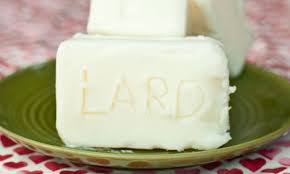lard
英 [lɑːd]
美 [lɑːrd]
- vt. 润色,点缀;涂加猪油
- n. 猪油
- n. (Lard)人名;(瑞典)拉德
星级词汇:

记忆方法
记忆“lard”这个单词时,可以将其与“large”结合记忆。想象一个大型容器里装满了“lard”(猪油),这样就可以将“lard”与“大”的量联系起来,帮助记忆其含义。
以上内容由AI生成, 仅供参考和借鉴
中文词源
lard 猪油
来自拉丁语lardum,猪油,熏肉。后仅指猪油。
英语词源
- lard (n.)
- late 14c. (possibly early 13c.), "rendered fat of a swine," from Old French larde "joint, meat," especially "bacon fat" (12c.), and directly from Latin lardum "lard, bacon, cured swine's flesh," probably cognate with Greek larinos "fat," laros "pleasing to the taste."
- lard (v.)
- "prepare (meat) for roasting by inserting of pieces of salt pork, etc., into it," mid-14c., from Old French larder "to lard" (12c.), from lard "bacon fat" (see lard (n.)). Figuratively, of speech or writing, from 1540s. Related: Larded; larding.
权威例句
- 1. I must render down this fat; we are short of lard.
- 我得把这块肥肉熬成油, 我们正缺猪油.
- 2. The lard has gone rancid.
- 这大油哈喇了.
- 3. The lard was tried in a big kettle.
- 这猪油在大锅熬炼.
- 4. Put water, butter and lard into a saucepan and bring slowly to the boil.
- 把水、黄油和猪油倒入平底锅,然后慢火煮沸。
- 5. " I got some lard, " he would add, as an afterthought.
- “ 我买了一些猪油, " 他会补充说, 像是又想起来了.